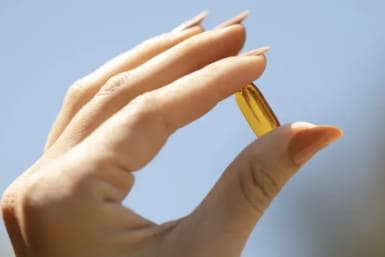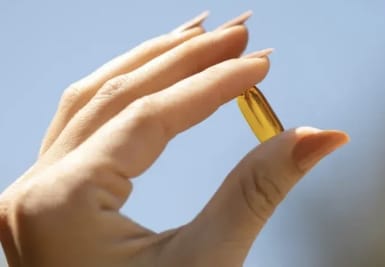6 Reasons Collagen Declines + How To Support It Naturally*


Collagen is a crucial element of your skin. This protein is responsible for giving your face that youthful bounce, and as it declines, fine lines appear. "Collagen literally holds us together—it makes up 30% of the body's protein and 70% of the skin's protein," functional medicine practitioner Robert Rountree, M.D., tells us. "The No. 1 cause of skin aging is the loss of collagen." So how does it decline? There are a few reasons—some are in your control and others aren't.
Below are the factors that reduce your collagen levels, plus what you can do to support them naturally:
UV exposure
There's a proven link between UV exposure (sunshine over time) and loss of collagen. One study observed collagen under UV light and found that there was a "significant decrease" in collagen structure afterward1. UV rays negatively impact collagen through "various mechanisms," board-certified dermatologist Gary Goldenberg, M.D., assistant clinical professor of dermatology at the Icahn School of Medicine at Mount Sinai in New York. says—including DNA changes to the cells that make collagen as well as the production of free radicals that can affect collagen directly via oxidative stress.
Age
Collagen production starts to dip in most people's bodies from the time they're in their late teens or early 20s and decreases about 1% a year2. However, the exact age that this process starts is different for everyone, says Goldenberg. This collagen attenuation picks up pace during and after menopause.
Regardless, the process is inevitable and, unfortunately, outside of your control. "Our bodies always balance collagen production and degradation," Goldenberg explains. "When we are young, our bodies produce more collagen than we break down. That balance tips the wrong way with age since tissue regeneration decreases."
Smoking
You've likely heard by now that smoking is, uh, not good for you and causes premature aging. Well the main reason it does so is because it directly and negatively affects collagen. In fact, smoking is the "big one" for collagen damage, Goldenberg says.
"Smoking decreases the amount of oxygen delivered to tissues. Therefore, tissue cannot regenerate and is more likely to become damaged and die," he explains. And that plus the oxidative stress of chemicals in tobacco smoke can lead to premature wrinkles. One study on twins found that those who smoked had more wrinkles, crow's feet, and facial lines than their non-smoking counterparts.
Inflammation-triggering diets
"Inflammation is one of the main enemies of any tissue," Goldenberg says—and the connective tissues fueled by collagen are no exception. Inflammatory diets, which often include eating plans that are high in sugar, simple carbohydrates, and processed meats, activate the immune system and promote inflammation throughout the body, says board-certified dermatologist Joshua Zeichner, M.D.
"This may interfere with healing, including healing of environmentally damaged skin cells," he says. Sugar3, in particular, can be tough on collagen. "High sugar levels can lead to hardening and fragmentation of collagen, weakening the skin foundation, and promoting premature skin aging," Zeichner says.
Stress
Research shows that stress can spark be pro-inflammatory4 and, again, that can lower your ability to naturally produce collagen. Stress also causes an increase in hormones like cortisol, which research has found can decrease the production of collagen. "Less collagen is produced in high-stress states since more of the body's resources are used to combat stress and the inflammation it produces," Goldenberg says.
Genetics
Genetics are an important factor in determining how much collagen your body makes and breaks down, Goldenberg says. So, if your parents and grandparents had great-looking skin for years, the odds are high your skin will be similar as you age. Of course, you don't have control over this, which is why Goldenberg recommends focusing on things you can control like diet, stress management, and UV protection.
How can you support it naturally?
You can't stop the natural drop in collagen production, but there are some things you can do to help promote healthy collagen levels in your body.*
Take a collagen supplement.*
Collagen supplements—or more specifically, hydrolyzed collagen supplements—have been shown to promote collagen production.* These supplements are made of collagen peptides, which are short chains of amino acids that make up collagen but are small enough to be absorbed easily5 by your body.* "Hydrolyzed collagen can be absorbed as is and circulate throughout the body," explains Zeichner.
But collagen does more than promote your body's natural production; it also helps temper some of the causes of collagen's decline. Namely? Free radical damage and oxidative stress. "Collagen's anti-inflammatory powers come from the role that it plays in our gut health. A healthy gut can reduce inflammatory processes throughout the whole body. Poor gut health, on the other hand, leads to stomach lining permeability, where particles can leak into the rest of the body, which then triggers inflammation in the body,"* naturopathic doctor Kellyann Petrucci, M.S., N.D., explains. "Collagen has been shown to support the gut's lining6 and has key amino acids for gut health."*
Eat antioxidants, especially vitamin C.
Antioxidants like vitamin C fight free radical damage, Goldenberg says. More specifically, "Whether taken internally or applied to the skin, antioxidants can reduce collagen breakdown by decreasing the amount of free radicals in the skin," he says. Vitamin C, in particular, has been found in research to support the production of collagen7 and to help manage its stability.* "Vitamin C is a necessary co-factor for the production of healthy collagen, and without it, new collagen cannot be properly made,"* Zeichner says.
Board-certified dermatologist Whitney Bowe, M.D., said it is one of her favorite supplements to take daily for glowing skin, as it promotes fibroblast proliferation8, and fibroblasts are the cells that produce collagen.*
Make good lifestyle choices, like wearing SPF and eating a healthy diet.
There are certain factors in collagen decline that you can't control, like your genes and your age. But there are some things you can do to slow the decline. Wearing sunscreen regularly is one of them.
"Sunscreen is one of the most important anti-aging skin care products, since UV exposure is a direct hit to collagen in your skin," Goldenberg says.
Diet is also crucial. "A healthy diet is necessary to provide the body with the necessary building blocks for optimal functioning," Zeichner says, adding that the Mediterranean diet is considered the best diet for your skin.
The takeaway
There's only so much you can do to slow the natural decline of collagen in your skin. But knowing the factors you can control, like avoiding UV damage and doing your best to support your collagen production—by taking a supplement—can go a long way toward giving you healthy-looking, firm skin in the future.*

Korin Miller is a freelance writer specializing in general wellness, relationships, and lifestyle trends with a master’s degree from American University. Her work has appeared in Women’s Health, Prevention, Self, Glamour, and more. She lives by the beach, and hopes to own a taco truck one day.
8 Sources
- https://www.ncbi.nlm.nih.gov/pmc/articles/PMC3299808/
- https://www.ncbi.nlm.nih.gov/pmc/articles/PMC3583892/
- https://www.ncbi.nlm.nih.gov/pubmed/20620757
- https://www.ncbi.nlm.nih.gov/pmc/articles/PMC5476783/
- https://www.ncbi.nlm.nih.gov/pubmed/16076145
- https://www.ncbi.nlm.nih.gov/pubmed/3792777
- https://www.ncbi.nlm.nih.gov/pubmed/1720597
- https://www.ncbi.nlm.nih.gov/pmc/articles/PMC5579659/

